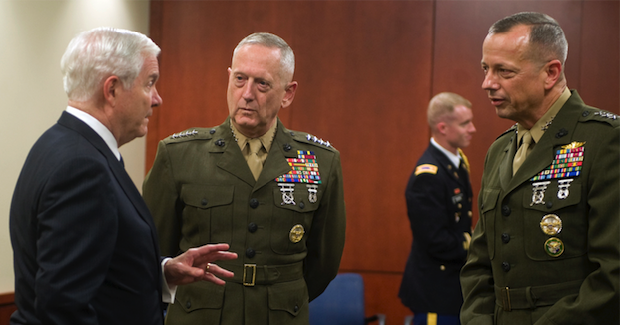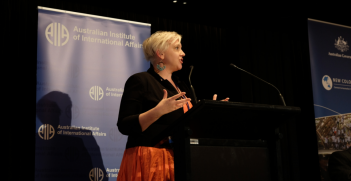Australia's Misstep on Nuclear Weapons Treaty

Australia will not attend next month’s United Nations summit to negotiate a global treaty to ban nuclear weapons. This is a missed opportunity and wrong turn for Australian foreign policy.
The election of Donald Trump has introduced considerable uncertainty around Asia-Pacific and European security, US nuclear policy and the future of the nuclear non-proliferation regime. Given this uncertainty, and as tensions crackle between Washington and Canberra, Australia has a crucial responsibility to take a more independent line in its foreign policy. This includes support for international efforts to stabilise and strengthen the nuclear non-proliferation regime and prevent the use of nuclear weapons. The Turnbull administration should seize the moment.
Contrasts within the US executive
On the one hand, it is reassuring that the new Secretary of Defense, James Mattis, has a nuanced understanding of nuclear matters. In congressional testimony Mattis showed awareness of the risks of inadvertent use, suggested eliminating land-based intercontinental ballistic missiles (ICBMs) from the US nuclear triad and supported consideration of a ‘sole use’ policy. He has also supported the Joint Comprehensive Plan of Action (JCPOA) that will prevent Iran developing nuclear weapons for the next 15 years.
On the other hand, during the campaign Trump stated that more states—Japan and South Korea, for example—should develop nuclear weapons and asked why the US cannot “use them, if we have them”. He also threatened to tear up the JCPOA with Iran. This frank but dangerous talk raises worries about US nuclear restraint and the potential spur to proliferation. We should also fear the return of Bush administration figures such as former Under Secretary of State (and UN Ambassador) John Bolton—now being put forward to replace Michael Flynn as Trump’s national security adviser—and strategist Keith Payne. They orchestrated highly destabilising nuclear strategies, vandalised international agreements on chemical and biological weapons and drove the 2005 Review Conference of the Treaty on the Non-Proliferation of Nuclear Weapons into failure.
Disarmament’s dilemma
All of this is happening as the nuclear non-proliferation regime faces a profound fork in the road. Last October, 123 states voted at the UN General Assembly to commence negotiations for a nuclear weapons ban treaty in 2017 (38 voted against, including Australia, and 16 abstained). This vote reflects a renewed concern about the awful humanitarian impact of any use of nuclear weapons, global frustration with the glacial pace of disarmament and a perception that many nuclear weapons states are thumbing their noses at their responsibilities under Article VI of the non-proliferation treaty (NPT).
A ban treaty would go beyond the NPT to explicitly prohibit the use and possession of nuclear weapons (which are currently legally reserved to five states) and would put enormous moral pressure on all nine nuclear weapon-capable states. Every state in our region voted in favour of negotiating a ban treaty. But Australia voted against. This, in our view, is a major missed opportunity and a mistaken direction for Australian foreign policy.
Australia’s rationalisations
Why did Australia—long a leader in efforts to promote creative thinking about nuclear disarmament—vote against the ban? There are two main reasons: the umbrella and the alliance. First, the Australian government perceives the country to be under the US nuclear umbrella, thus a ban treaty would undermine a key—if understated—element of our defence policy. Second, the United States has constructed a united front of opposition to the ban proposal amongst its NATO and Asia-Pacific allies (the so-called ‘umbrella states’) and the Australian government likely fears that the US-Australian alliance would be negatively affected if it broke away from that united position.
However, neither of these reasons hold up when exposed to serious analysis and they create a tangle of contradictions in Australia’s nuclear diplomacy. Such analysis would in fact move us towards an appreciation that it would be in Australia’s national security and foreign policy interest to support a ban treaty. Australia has not given serious consideration to the global security benefits of a ban treaty or the ways in which our support for extended deterrence undermines the non-proliferation regime and exacerbates nuclear risks.
Considering the rationales
First, the nuclear umbrella. Extended deterrence in its current form increases the risk of nuclear war. If the US, UK and France had ‘no first use’ and ‘sole use’ policies, extended deterrence would be less controversial. It might reinforce the norm against nuclear use and promote stability, if still contributing to the overall system of nuclear risks. However, when used as a hedge against conventional attack, it becomes extremely dangerous and destabilising. The use of nuclear weapons in a conventional war would contravene the law of armed conflict and could trigger escalation to a major nuclear exchange.
Emphasising extended nuclear deterrence is not in Australia’s security interest. It is important to note that there is no official, publicly available US assurance of nuclear support for Australia if there were a nuclear threat or attack. This is in contrast to the commitments provided to NATO states, South Korea, and Japan, for example.
It may be possible that in a nuclear war the joint facilities could be targeted, which would be devastating for Alice Springs and parts of the Northern Territory. However, Australia should emphasise the facilities’ contribution to global nuclear verification and early warning, and should insist that adversaries respect our status as a non-nuclear weapon state and extend nuclear security assurances to us. Given that, extended nuclear deterrence should only be relied on in extremis, and should be quietly dropped from Australian defence policy.
Second, the alliance. Clearly, the US alliance has strategic value, but at a time of considerable policy uncertainty in Washington, and with Trump’s vitriolic ‘Twitter diplomacy’ towards Canberra, Australia must assert its prerogative to determine its own interests in support of the nuclear non-proliferation regime and its core disarmament goal. If the Trump administration’s policy moves radically in the wrong direction—and it likely will—asserting more diplomatic independence will become crucial to our national interests.
In sum, extended deterrence and the US alliance do not stand in the way of us supporting a nuclear ban treaty. Nor, contrary to what Australian diplomats say, would it stand in the way of further bilateral arms control and disarmament between the nuclear weapon states. In fact, it could help place pressure on Russia to resume arms control efforts with the United States, and also place moral pressure on other nuclear powers to join multilateral disarmament efforts. And if the Trump administration reverses Obama’s openness to new negotiations, it could place pressure on the US as well.
Applying political pressure
In the meantime, no one expects nuclear states to join a ban treaty, but states like Australia can urge them to reduce the salience of nuclear weapons in their security policy and make tangible measures to promote strategic stability and prevent nuclear use.
Australia should reverse its opposition to a ban treaty, and offer to join the negotiations. We should participate constructively with a view to ensuring that its provisions be simple and clear, and supported by a workable verification system so that any nuclear state or states which disarm can join it at a future date. It would not be appropriate for a ban treaty to try to be a full Nuclear Weapons Convention, which is better thought of as a more complex architecture to secure a fully disarmed world. In this way, a ban treaty can support and be linked to the broader non-proliferation architecture of the NPT, and make a major contribution to renewing global disarmament momentum.
The 15,000 extant nuclear weapons remain the single most dangerous threat to our planet. We have been very lucky that the world has not seen a war with nuclear weapons or the detonation of one of these weapons by accident.
Getting a ban treaty to outlaw nuclear weapons is a high priority for the international community. We have successfully banned chemical and biological weapons, and these treaties showed that stigmatising and banning a weapon is an important first step in ultimately eliminating them. As with chemical and biological weapons, landmines and cluster munitions, a ban treaty will stand as a powerful statement against nuclear weapons. While it won’t guarantee elimination, its normative force will help to prevent a disastrous nuclear calamity and set us back on the path to a much safer, nuclear-free world.
Marianne Hanson is associate professor at the University of Queensland and director at the Rotary Centre for International Studies in Peace and Conflict Resolution.
Anthony Burke is professor of international and political studies at the University of New South Wales, Canberra. He is the author of ‘Uranium’ (Polity Press, 2017).
Maria Rost Rublee is associate professor at Monash University’s School of Social Sciences. Her book, ‘Why States Choose Nuclear Restraint’, received the Alexander George Book Award.
This article is published under a Creative Commons Licence and may be republished with attribution.





